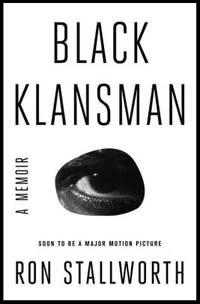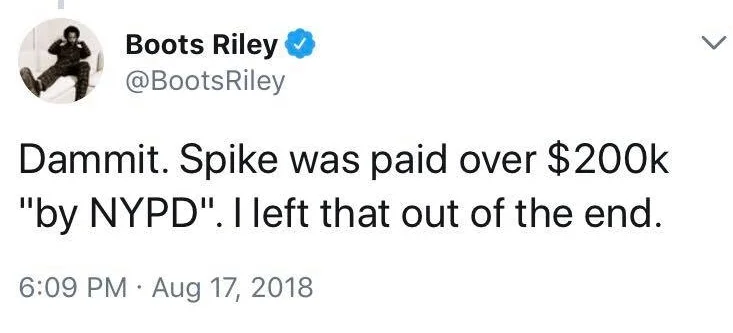DGCINE y ACU crean un cinefórum mensual en la Cinemateca Dominicana para fortalecer audiencias, exhibición continua y diálogo público del documental dominicano.
INDEX premia cortometrajes de la diáspora en «Huellas de mi Quisqueya» 2025
CineCommentFrida Pérez marca historia dominicana en los Emmy 2025
CineComment«A Tiro Limpio»: el cine de República Dominicana llega con gran fuerza al United Palace y al Festival de Cine Latino de NY
Cine, Dominican cinema, FilmCommentCon un pasaje de ida Agliberto Meléndez hace su partida y fallece a los 82 años
Cine, Dominican cinemaCommentThree Documentaries to Watch at the Dominican Film Festival
Film, Dominican cinemaCommentIsla de Plástico busca reciclar el problema en RD
Cine, FilmCommentDid Spike Lee Lose His Groove?
FilmCommentBy ESENDOM
September 6, 2018
Did he or didn’t he?
Spike Lee, the popular filmmaker known for classic cinematic works such as Do The Right Thing, Malcolm X and Jungle Fever, came under criticism a few days after the release of BlacKkKlansman, his latest film.
On August 17, musician, filmmaker and activist Boots Riley took aim at Spike Lee’s film which, by the way, has received positive reviews in the mainstream media. In his Twitter account Boots Riley, whose film Sorry to Bother You is creating quite a stir in American cinema, wrote an honest and respectful two-page critique of the film. But first, Riley acknowledged Lee’s influence on him:
“Spike Lee has been a huge influence on me. He’s the reason I went to film school so many years ago. He’s the first person I sent a demo tape of my music to when he had 40 Acres and A Mule Musicworks, and he has inspired me as a cultural critic as well.”
Afterwards, Boots Riley, lead singer of The Coup, threw his darts at the revered and influential African-American filmmaker:
First, BlacKkKlansman is not a true story. A story not being “true” is not necessarily a problem for me—I have no interest in telling them myself at this time—but this is being pushed as a true story and it is precisely its untrue elements that make a cop a hero against racism. When I voiced some criticism before, a few people said “but it’s a true story!” It’s not.
It’s a made up story in which the false parts of it to try to make a cop the protagonist in the fight against racist oppression. It’s being put out while Black Lives Matter is a discussion—and that is not coincidental. There is a viewpoint behind it.
Riley went into detail and explained point-by-point why BlacKkKlansman, despite the good intentions to denounce white supremacy, turns out to be another problematic movie. In fact, Riley questioned the memoir that inspired the film since Ron Stallworth, who claimed to have infiltrated the Ku Klux Klan in the 1970s, “wrote a memoir to put himself in a different light, but let’s look at what else we know. There was no bombing that Stallworth or the police thwarted. This was not in Stallworth’s memoir. That was made up for the movie to make the police seem like heroes,” according to Riley.
In his Twitter critique, Riley could not hide his disappointment with Spike Lee:
Look, we deal with racism not just from physical terror or attitudes of racist people, but in pay scale, housing, health care, and other material quality of life issues. But to the extent that people of color deal with actual physical attacks and terrorizing due to racism and racist doctrines, we deal with it mostly from the police on a day to day basis. And not just from White cops. From Black cops too. So for Spike to come out with a movie where story points are fabricated in order to make Black cop and his counterparts look like allies in the fight against racism is really disappointing, to put it very mildly.
On August 24, Spike Lee lashed back at Riley’s criticism in an interview with the U.K’s The Times newspaper:
"Look at my films: they’ve been very critical of the police, but on the other hand I’m never going to say all police are corrupt, that all police hate people of color. I’m not going to say that. I mean, we need police."
Riley’s sharp critique of Spike Lee’s latest film is an indication that a once-irreverent filmmaker lost his groove and a new generation of African-American filmmakers like Riley, are picking up where he left off.
___
«La Entre Viú» un cortometraje que nos deja deseando más
Cine, FilmCommentZoë Saldaña: A Star with a Hollywood Star
Film, Cine1 CommentColao valida el cine dominicano
Cine, FilmCommentDominican Actors Give Dominican Film Colao its Aroma
CommentEstrellas dominicanas le ponen el aroma al café de Colao en 809
Cine, Film2 CommentsWith Camera in Hand, Etzel Báez Keeps Alive the Memory of a Crime
Cine, FilmCommentCon cámara en la mano, Etzel Báez mantiene viva la memoria de un crimen
Cine, FilmComment6th Dominican Film Festival is More than Merengue and Bachata: “We Are Cinema”
, Cine, FilmCommentMiguel T. gana Concurso ESENDOM
CommentEl pasado viernes, 21 de julio, tomó lugar el Concurso ESENDOM, donde concursantes tuvieron la oportunidad de ganar boletas para el sexto Festival de Cine Dominicano en Nueva York.
Miguel T. fue el ganador, ya que contestó de manera correcta nuestras tres preguntas:
1. En el 1988, René Fortunato produjo este documental acerca de La Guerra de Abril del 1965. ¿Cuál es el título de esta obra?
2. ¿Cómo se llamaba la "Queen of Technicolor" o "Reina del Technicolor"?
3. ¿Cómo se llama el fundador del Festival de Cine Dominicano en Nueva York?
Nuevamente, felicidades Miguel.
Respuestas:
- La trinchera del honor
- María Montez or María África Gracia Vidal
- Armando Guareño
ESENDOM held a contest last Friday, July 21, 2017. The contest asked three questions:
1. In 1988, René Fortunato produced this documentary pertinent to the Dominican Republic’s “Guerre de Abril” of 1965 (War of 1965). What is the name of the documentary?
2. What is the name of the “Queen of Technicolor?”
3. Who is the founder of the Dominican Film Festival in New York?
(Scroll down for the answers)
Answers to ESENDOM Dominican Film Festival Contest:
1. La trinchera del honor
2. María Montez or María África Gracia Vidal
3. Armando Guareño
Relacionado
6th Dominican Film Festival is More than Merengue and Bachata: “We Are Cinema”
¡Somos más que bachata y merengue, somos cinema! : Sexto Festival Cine Dominicano en NY



